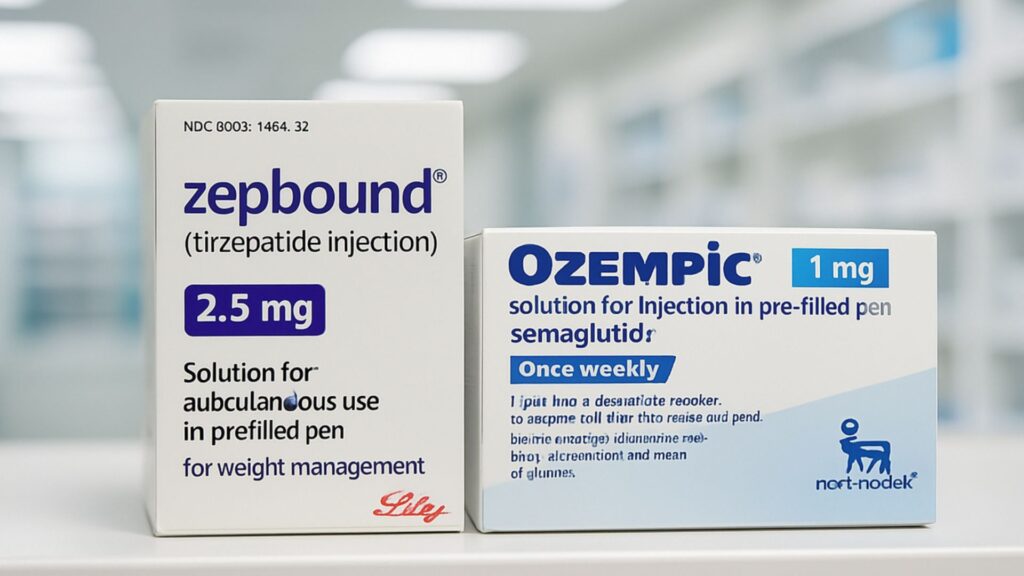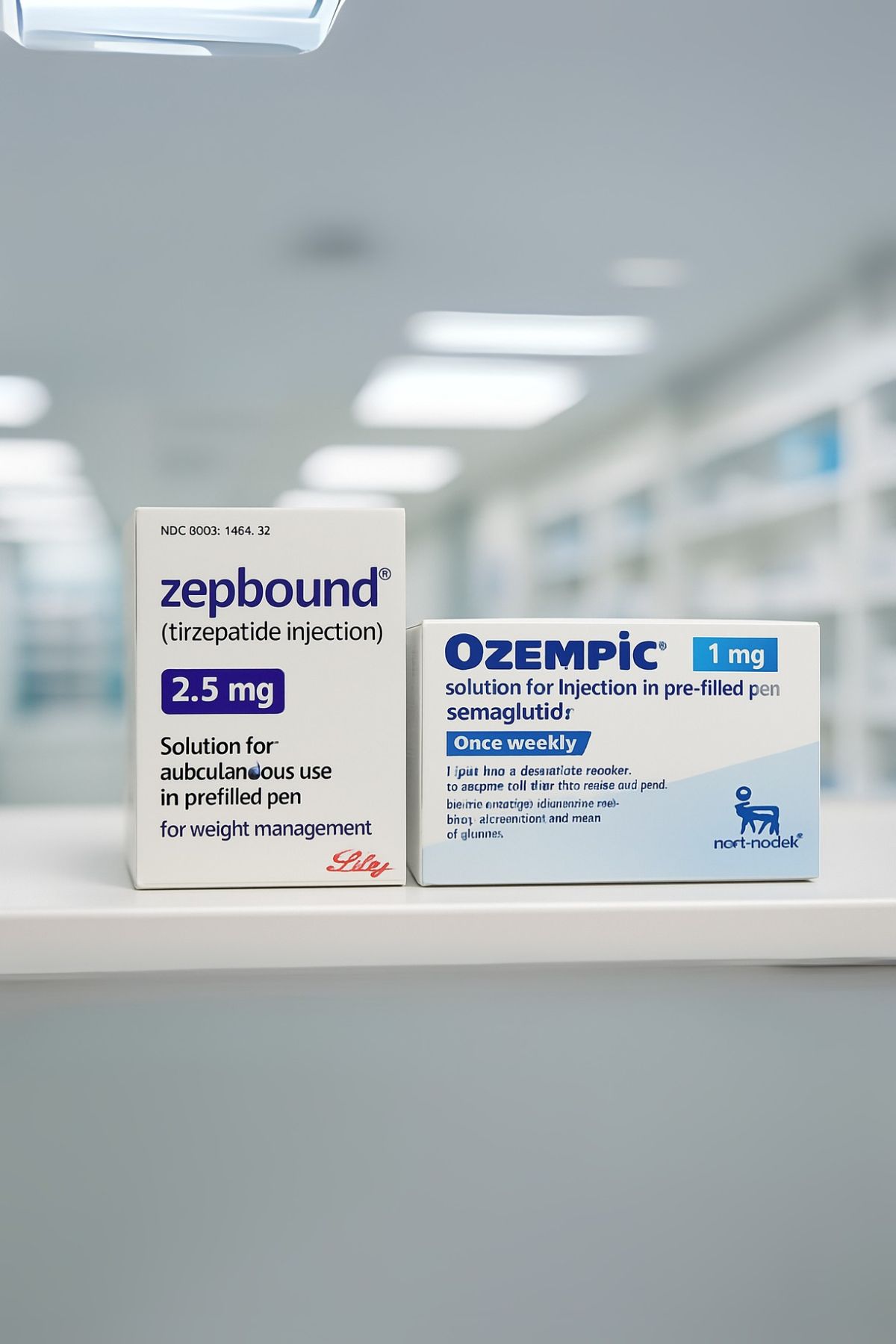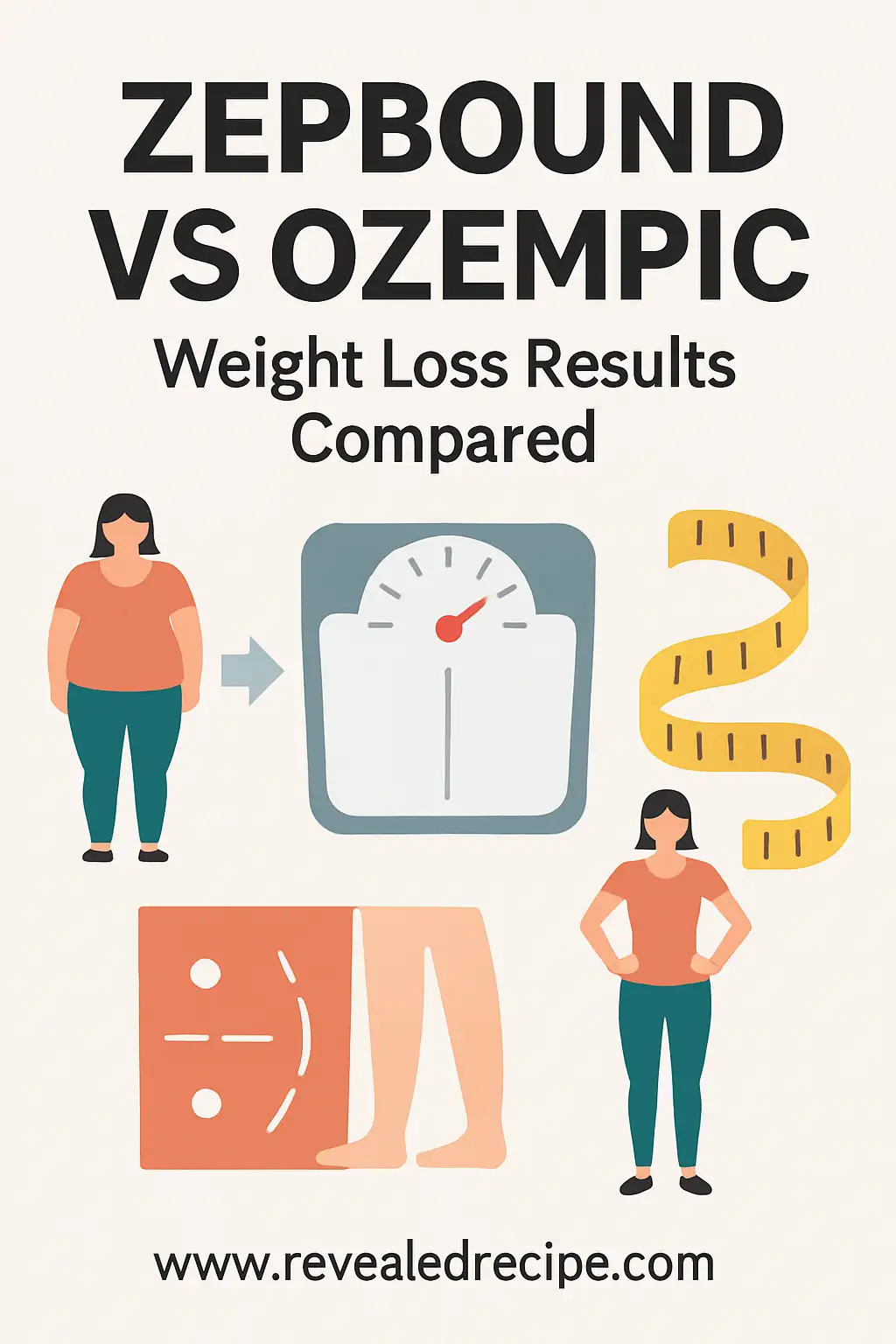Uncovering the Truth About Zepbound vs Ozempic for Better Health
In today’s health and wellness world, the debate over Zepbound vs Ozempic has become more intense than ever. Both medications promise effective solutions for weight loss and diabetes management. But which one truly works best? In this article, we’ll break down everything from how they work, their ingredients, side effects, and pricing to help you make an informed decision. Plus, we’ll dive into user testimonials and expert advice to provide a complete perspective. If you’re struggling to pick between Zepbound and Ozempic, you’ve come to the right place.
Looking for inspiration? Try this practical Zepbound recipe for weight loss to kickstart your wellness journey.
Table of Contents
For more natural ways to curb cravings, explore our list of Homemade Appetite-Suppressant Drinks that don’t rely on medications.
Understanding Zepbound and Ozempic
What is Zepbound?
Zepbound is a new-generation medication designed for weight loss and diabetes management. It contains tirzepatide, a dual-agonist GLP-1/GIP receptor drug. This means Zepbound targets two different gut hormones that control appetite and blood sugar, making it a powerful player in the weight loss space. Initially approved by the FDA for obesity treatment, it is now widely recognized for helping patients shed stubborn pounds where diet and exercise alone fail.
Unlike traditional options, Zepbound acts faster in adjusting your metabolism. Clinical trials have shown that Zepbound users often lose a higher percentage of their body weight compared to those using Ozempic. This makes it a compelling choice when comparing zepbound vs ozempic weight loss results.
Discover great ideas like Natural Zepbound Drink Recipes to support your treatment naturally.
What is Ozempic?
Ozempic, on the other hand, is built around semaglutide, a single-agonist GLP-1 receptor drug. Originally prescribed for type 2 diabetes, Ozempic gained massive popularity when celebrities and influencers began using it off-label for weight loss. Unlike Zepbound, Ozempic only stimulates one hormone responsible for appetite regulation and blood sugar control.
Although effective, Ozempic typically results in slightly lower weight loss percentages compared to Zepbound. However, it’s well-known for its cardiovascular benefits, making it a strong contender for individuals with heart disease.
When considering zepbound vs ozempic dosage, it’s important to note that Zepbound often has a faster dosage escalation, helping patients reach their maintenance dose sooner.
Check out easy detox drinks to complement your weight loss routine and help flush toxins while on these medications.
Or try the natural pink salt drink recipe for metabolism support.
Zepbound vs Ozempic Weight Loss Results
Clinical Trials and Real-World Effectiveness
When comparing Zepbound vs Ozempic weight loss outcomes, clinical trials speak volumes. In the SURMOUNT-1 trial, participants taking Zepbound (tirzepatide) experienced an average body weight reduction of up to 22.5%, a remarkable difference compared to Ozempic’s 15% reduction observed in its STEP-1 trial. That’s a serious gap for anyone measuring their success on the scale.
But clinical results aren’t everything. Real-world users report variations in how quickly they lose weight, depending on diet, exercise, and medication adherence. Some patients on Zepbound noticed changes within four weeks, while Ozempic users reported slower but steady progress over three months. Factors like baseline body mass index (BMI) and metabolic health also play a role.
So, which one is better? If rapid and significant weight loss is your goal, the Zepbound vs Ozempic weight loss contest tips toward Zepbound. However, those with cardiovascular conditions may benefit more from Ozempic’s protective effects.
Looking for inspiration? Try these detox drink recipes to enhance your results naturally during your weight loss journey.
How Much Weight Can You Lose with Zepbound vs Ozempic?
If you’re wondering exactly how much weight you might shed, here’s what studies and user reviews suggest:
| Medication | Average Weight Loss (%) | Estimated Pounds Lost (for 200 lb person) |
|---|---|---|
| Zepbound | 15-22.5% | 30 – 45 lbs |
| Ozempic | 8-15% | 16 – 30 lbs |
These numbers reflect consistent use over 6 to 12 months, combined with lifestyle changes. But remember, results vary widely. Some patients might lose 20 lbs in a month on Zepbound, while others may take several months to see similar results.
The key takeaway: weight loss is a marathon, not a sprint. If you’re stuck despite using either drug, check out Javy protein coffee reviews for an easy metabolism boost.
Zepbound vs Ozempic Ingredients and Formulas
Tirzepatide in Zepbound vs Semaglutide in Ozempic
At the heart of the Zepbound vs Ozempic debate lies their core active ingredients. Zepbound contains tirzepatide, a unique dual-agonist molecule that stimulates both GLP-1 (glucagon-like peptide-1) and GIP (glucose-dependent insulinotropic polypeptide) receptors. This double action improves insulin sensitivity, curbs appetite, and slows gastric emptying. The result? A more holistic approach to managing weight and blood sugar.
On the flip side, Ozempic’s active ingredient is semaglutide, a single-agonist drug that targets only GLP-1 receptors. While still highly effective for diabetes and weight control, it offers a narrower hormonal impact compared to tirzepatide.
For patients who haven’t responded well to semaglutide, switching to tirzepatide may unlock better weight loss results. This is where the question of can you switch from semaglutide to Zepbound? becomes important, and the answer is yes, with proper medical guidance.
Don’t miss our helpful guide on natural Zepbound drink recipes to enhance your weight loss efforts alongside medication.
For more recipes follow us on Facebook, Instagram and Pinterest.
Dual-Agonist vs Single-Agonist Mechanisms
Understanding the agonist mechanism is key to seeing why Zepbound vs Ozempic weight loss results differ. Here’s a simple breakdown:
| Feature | Zepbound (Tirzepatide) | Ozempic (Semaglutide) |
|---|---|---|
| Drug Type | Dual-agonist | Single-agonist |
| Targets | GLP-1 & GIP receptors | GLP-1 receptor only |
| Appetite Suppression | More significant | Moderate |
| Insulin Secretion | Higher response | Strong, but lower |
| Weight Loss | Up to 22.5% | Up to 15% |
Tirzepatide’s ability to stimulate both hormone pathways means you’re getting double the metabolic support. This is why some patients who plateau on Ozempic experience renewed weight loss success when they switch to Zepbound.
Check out our favorite protein coffee recipe to support balanced energy levels while on your medication plan.
Comparing Zepbound vs Ozempic Side Effects
Common and Severe Side Effects of Zepbound
No medication is without side effects, and when considering Zepbound vs Ozempic, it’s important to weigh the risks. Most people using Zepbound experience some digestive discomfort at the start. The most common side effects include:
| Common Zepbound Side Effects | Occurrence Rate |
|---|---|
| Nausea | High |
| Diarrhea | Moderate |
| Constipation | Moderate |
| Headache | Low |
| Fatigue | Low |
Zepbound’s dual-agonist activity may explain why some users report stronger gastrointestinal issues compared to single-agonist drugs. Yet for many, these symptoms fade after the first few weeks. Interestingly, some patients ask, “Does Zepbound cause constipation like Ozempic?” The answer: yes, but it varies by person.
Rare but serious side effects include pancreatitis and gallbladder disease. Always consult a healthcare provider if severe abdominal pain occurs.
Don’t miss our easy detox drinks to naturally support your digestive system while adjusting to these medications.
Ozempic Side Effects and Long-Term Safety
Ozempic, known for its semaglutide base, shares several side effects with Zepbound but tends to cause milder digestive issues. Here’s what most users experience:
| Common Ozempic Side Effects | Occurrence Rate |
|---|---|
| Nausea | Moderate |
| Vomiting | Low |
| Diarrhea | Moderate |
| Constipation | Low |
| Loss of Appetite | High |
In the zepbound vs ozempic side effects debate, Ozempic generally has a gentler side effect profile. However, it’s worth noting that semaglutide has been on the market longer, so its long-term safety profile is better understood.
But what about serious risks? Ozempic carries warnings for thyroid tumors (in rodent studies), pancreatitis, and kidney injury—similar to Zepbound. Bottom line? Both medications require medical supervision, but Ozempic’s longer track record gives it a slight safety edge.
Zepbound vs Ozempic Dosage and Usage Guidelines
Recommended Dosages for Weight Loss and Diabetes
When evaluating Zepbound vs Ozempic dosage, it’s clear these medications follow distinct dosing schedules, tailored to their mechanisms of action. Both drugs start at a lower dose to minimize side effects but ramp up differently:
| Drug | Starting Dose | Maintenance Dose | Dose Escalation Timeline |
|---|---|---|---|
| Zepbound | 2.5 mg once weekly | Up to 15 mg once weekly | Increases every 4 weeks |
| Ozempic | 0.25 mg once weekly | Up to 2 mg once weekly | Increases every 4 weeks |
Zepbound, with its dual-agonist mechanism, allows for higher maintenance doses, leading to greater metabolic impact and potentially quicker weight loss. Ozempic’s lower dose range focuses more on stable blood sugar control.
It’s essential to follow your doctor’s instructions and not rush the dosing process. Increasing too quickly may intensify side effects, especially nausea or constipation. Some patients even wonder, “Can I take Zepbound every 5 days?” No, the FDA-approved regimen for Zepbound is once per week.
How Dosage Adjustments Work for Zepbound and Ozempic
Both Zepbound and Ozempic dosages adjust gradually, allowing the body to adapt to hormonal changes. But Zepbound’s escalation tends to be quicker, meaning users reach their maximum dosage sooner. This faster ramp-up may partly explain why some individuals report losing weight faster on Zepbound.
It’s worth noting that individuals switching medications (e.g., from semaglutide to tirzepatide) need careful dose recalibration. Doctors will often lower the initial Zepbound dose when transitioning from Ozempic to avoid doubling the effect and risking stronger side effects.
If your appetite or weight plateau despite the proper dosage, don’t miss our detox drink recipes to support your metabolism and hydration during your weight loss journey.
Zepbound vs Ozempic Cost and Insurance Coverage
Zepbound Price vs Ozempic Price
One of the biggest concerns when choosing between Zepbound vs Ozempic is cost. Both medications are expensive without insurance, but price differences do exist. Let’s break it down:
| Drug | Average Monthly Cost (No Insurance) | With Insurance or Discounts |
|---|---|---|
| Zepbound | $1,060 – $1,200 | $25 – $550 |
| Ozempic | $900 – $1,050 | $0 – $500 |
The Zepbound price tends to be slightly higher due to its newer market release and dual-agonist technology. However, both manufacturers (Eli Lilly for Zepbound and Novo Nordisk for Ozempic) offer savings cards and patient assistance programs to help offset these costs.
If you’re comparing Zepbound vs Ozempic price long-term, your insurance plan is the deciding factor. For some users, tirzepatide vs ozempic cost may show Zepbound as the more affordable option due to newer rebates.
Want to keep your healthy habits budget-friendly? Discover great ideas like this natural Zepbound drink recipe to support your weight loss without breaking the bank.
Tirzepatide vs Ozempic Cost, and Zepbound vs Wegovy Cost
Beyond Zepbound vs Ozempic, people often compare these drugs to Wegovy, another GLP-1 receptor agonist. Here’s a quick comparison:
| Drug | Active Ingredient | Avg. Monthly Cost (No Insurance) |
|---|---|---|
| Zepbound | Tirzepatide | $1,100 |
| Ozempic | Semaglutide | $950 |
| Wegovy | Semaglutide | $1,350 |
In the zepbound vs wegovy cost debate, Wegovy comes out as the most expensive. However, all three drugs provide competitive weight loss results depending on your individual health profile.
Many patients also ask about insurance. While Ozempic is more commonly covered for diabetes, Zepbound’s FDA approval for obesity opens doors for coverage under weight loss plans. Comparing zepbound vs ozempic price in your insurance plan’s drug formulary is essential.
Check out our easy detox drinks to maximize the benefits of your medication, regardless of which one fits your budget.
Alternative Weight Loss Medications: Wegovy, Mounjaro, and More
Wegovy vs Ozempic vs Zepbound: Which Works Better?
When comparing Zepbound vs Ozempic, it’s easy to forget there’s a third contender—Wegovy. All three medications belong to the GLP-1 receptor agonist family, but their chemical compositions and results differ.
| Drug | Generic Name | Main Use | Weight Loss Potential |
|---|---|---|---|
| Zepbound | Tirzepatide | Weight loss & diabetes | 15% – 22.5% |
| Ozempic | Semaglutide | Diabetes (off-label weight loss) | 8% – 15% |
| Wegovy | Semaglutide (higher dose) | FDA-approved for weight loss | 15% – 20% |
In the battle of zepbound vs ozempic vs wegovy, Zepbound often leads in terms of percentage weight loss. Wegovy follows closely behind, while Ozempic, though effective, lags a bit for pure weight loss results. However, cost and insurance coverage may sway your choice. As covered in Part 6, the zepbound vs wegovy cost comparison shows Wegovy as the priciest option.
Still unsure which drug is right for you? Don’t miss our detox drink recipes to naturally boost your metabolism alongside your chosen medication.
Future Drug Developments and Better Options Than Ozempic?
Is there a new drug better than Ozempic? Possibly. Several next-gen GLP-1 and dual-agonist medications are in clinical trials. Pharmaceutical companies are racing to develop triple-agonist drugs targeting GLP-1, GIP, and glucagon receptors, potentially outperforming both Zepbound vs Ozempic in weight loss efficiency.
Among the most talked-about are retatrutide and newer formulations of tirzepatide. While Zepbound vs Ozempic remains the gold standard today, future medications could make both seem outdated in a few years.
For now, though, Zepbound holds the edge for aggressive weight loss goals. Ozempic shines for stable, long-term diabetes management.
Real User Experiences and Testimonials
How Users Feel on Zepbound vs Ozempic
When it comes to the real-world battle of Zepbound vs Ozempic, user stories reveal important differences beyond clinical data. Many patients on Zepbound report feeling fuller faster and experiencing a more noticeable reduction in cravings. Some describe a steady burst of energy and a “reset” in their hunger patterns within the first few weeks.
By comparison, Ozempic users often mention a slower onset of appetite suppression but fewer intense gastrointestinal issues. While weight loss happens, it tends to progress more gradually, which some find easier to sustain long-term.
Both medications can cause emotional and physical ups and downs, especially during the first dose escalation period. Fatigue, mood swings, and digestive discomfort are common but typically fade with time. So, is there a clear winner in the Zepbound vs Ozempic debate from users’ perspectives? Not exactly—experiences vary widely based on metabolism, lifestyle, and underlying health conditions.
Looking for inspiration? Try this natural Zepbound drink recipe that some users include in their weekly wellness routines.
Success Stories and Challenges from Real People
Let’s look at some success stories and common challenges:
| User Experience | Zepbound | Ozempic |
|---|---|---|
| First noticeable weight loss | 2–3 weeks | 4–6 weeks |
| Appetite suppression level | Strong | Moderate |
| Common side effects reported | Nausea, constipation | Nausea, mild fatigue |
| Typical weight loss in 3 months | 15–25 lbs | 10–20 lbs |
| Ease of adjusting dosage | Moderate | Easy |
But it’s not all smooth sailing. Some patients say they stop losing weight on Zepbound, triggering frustration. Others switch from Ozempic to Zepbound and finally break their plateau. Ultimately, finding the right medication often means trial and error under medical supervision.
Want to fuel your day with something healthy? Don’t miss our energizing protein coffee recipe, a favorite among our wellness community.
Making the Right Choice: Which is Better for You?
Factors to Consider When Choosing Between Zepbound vs Ozempic
So, which one wins the Zepbound vs Ozempic debate? Honestly, the answer depends on your personal health goals and medical history. Here are some key factors to help you decide:
| Factor | Zepbound | Ozempic |
|---|---|---|
| Primary goal | Rapid weight loss | Blood sugar control + weight loss |
| Active ingredient | Tirzepatide | Semaglutide |
| Onset of weight loss | Faster | Slower but steady |
| Cardiovascular benefits | Emerging research | Strong evidence |
| Dosage flexibility | Higher maximum dose | More gradual increase |
| Side effects intensity | Potentially stronger at first | Generally milder |
| Price (without insurance) | Slightly higher | Moderate |
If your goal is aggressive weight loss and your body tolerates medication well, Zepbound might be your best bet. But if you’re focused on managing type 2 diabetes with steady weight loss and want a drug with a longer safety record, Ozempic could be the smarter choice.
Importantly, consult your healthcare provider before making any changes. They’ll help weigh the risks and benefits and design a plan that works for your body. Many patients switch between the two medications during their journey, optimizing their results over time.
Consultation Tips for Discussing Zepbound vs Ozempic with Your Doctor
When talking to your doctor, don’t just ask, “Which one’s better?” Instead, bring up specifics:
- “Given my weight loss goals, would Zepbound or Ozempic fit better?”
- “Should I start at a lower Zepbound dosage to minimize side effects?”
- “Does my insurance cover both medications, and what are the zepbound vs ozempic price differences for me?”
- “How do you monitor side effects, and when should I switch medications?”
Also, ask about new therapies on the horizon. Several weight loss medications in clinical trials may soon outperform both Zepbound and Ozempic.
And while you’re optimizing your health plan, don’t miss our favorite Javy protein coffee reviews to fuel your mornings naturally.
Zepbound vs Ozempic : Which One Should You Choose?
Deciding between Zepbound vs Ozempic comes down to your health goals, lifestyle, and how your body responds to medication. If you’re targeting significant weight loss quickly, Zepbound’s dual-agonist approach with tirzepatide often delivers faster and more powerful results. On the other hand, Ozempic remains a proven, safe choice for managing type 2 diabetes with steady weight loss over time.
Pricing is another factor. The zepbound vs ozempic price comparison shows Zepbound generally costs more without insurance, though savings programs may close that gap. As we’ve seen, both medications have side effects, especially during the first few weeks, but many users find them tolerable.
Whichever option you choose, stay consistent with your treatment, prioritize healthy eating, and consider supplements like our easy detox drinks to support your journey. Remember, no medication works in isolation, it’s your commitment to the process that creates long-term success.
Discover great ideas like our Javy protein coffee reviews for healthy ways to fuel your morning.
FAQs About Zepbound vs Ozempic
Is Zepbound better for weight loss than Ozempic?
In most studies comparing Zepbound vs Ozempic, Zepbound leads in weight loss results. On average, people lose between 15% and 22.5% of their body weight on Zepbound, while Ozempic users see reductions of 8% to 15%. However, individual results vary.
Are Zepbound side effects worse than Ozempic?
Some users report that Zepbound’s side effects are more intense, especially nausea and constipation. But many people tolerate it well after the first month.
Does Zepbound cause constipation like Ozempic?
Yes, both Zepbound and Ozempic can cause constipation. The zepbound vs ozempic side effects comparison shows both have similar digestive issues, especially during the dose escalation phase.
How do you feel on Zepbound?
Initially, some people experience nausea and fatigue. After adjustment, many feel more energetic and less hungry.
How safe is Zepbound?
Zepbound is FDA-approved for weight loss and generally safe when used correctly, but it still carries risks like pancreatitis and gallbladder disease.
Which drug outperforms Ozempic for weight loss?
So far, Zepbound outperforms Ozempic in most clinical trials focused on weight loss.
Do Zepbound and Ozempic have the same ingredients?
No, Zepbound contains tirzepatide, a dual-agonist drug, while Ozempic uses semaglutide, a single-agonist. This difference explains why Zepbound vs Ozempic weight loss outcomes are not identical.
What is the new drug that is better than Ozempic?
Zepbound is considered one of the most promising newer drugs outperforming Ozempic for weight loss. Other drugs like retatrutide are still in clinical trials but may soon surpass both.
Can I take Zepbound every 5 days?
No. Zepbound is FDA-approved for once-weekly use. Taking it every 5 days is not recommended and could increase side effects.
Do you gain weight back after stopping Zepbound?
Unfortunately, yes. Weight regain is common if lifestyle changes aren’t maintained after stopping Zepbound vs Ozempic.
Can you lose 20 lbs in a month on Zepbound?
While possible for some, losing 20 lbs in a month is rare and should be monitored closely to avoid health risks.
How is Zepbound different from Ozempic?
The core difference in Zepbound vs Ozempic is their mechanism: Zepbound targets two gut hormones (GLP-1 and GIP), while Ozempic targets only one (GLP-1).
How quickly does Zepbound work?
Most users report appetite suppression within the first 1–2 weeks and noticeable weight loss within the first month.
How much is Zepbound without insurance?
Without insurance, zepbound price ranges from $1,060 to $1,200 per month, but discount programs can lower this substantially.
How long does Zepbound stay in your system?
Tirzepatide’s half-life is about 5 days, meaning it stays in your system for around 3-4 weeks after your last dose.
Can you switch from semaglutide to Zepbound?
Yes, and this switch is common among people plateauing on Ozempic. Always consult a healthcare provider before making this change.
Is there a better weight loss option than Ozempic?
At present, Zepbound often shows better weight loss outcomes. Future medications like retatrutide may offer even greater results.
How much weight do you lose on Zepbound?
Over time, patients may lose up to 22.5% of their body weight, depending on their adherence and lifestyle.
Why am I not losing weight on Zepbound?
If you aren’t losing weight on Zepbound, factors like diet, physical activity, sleep, and underlying metabolic conditions may be limiting progress. Consult your doctor to adjust your treatment plan.
How much weight can you lose on Zepbound in 3 months?
Many people lose between 15 to 25 pounds in the first three months, depending on their starting weight and lifestyle habits.
Can I switch from Ozempic to Zepbound?
Yes, with your doctor’s approval, you can switch. Dosage adjustments are essential during this transition to avoid excessive side effects.
Is Zepbound worth it?
For many seeking rapid weight loss, yes. But consider the zepbound price and potential side effects before deciding.













